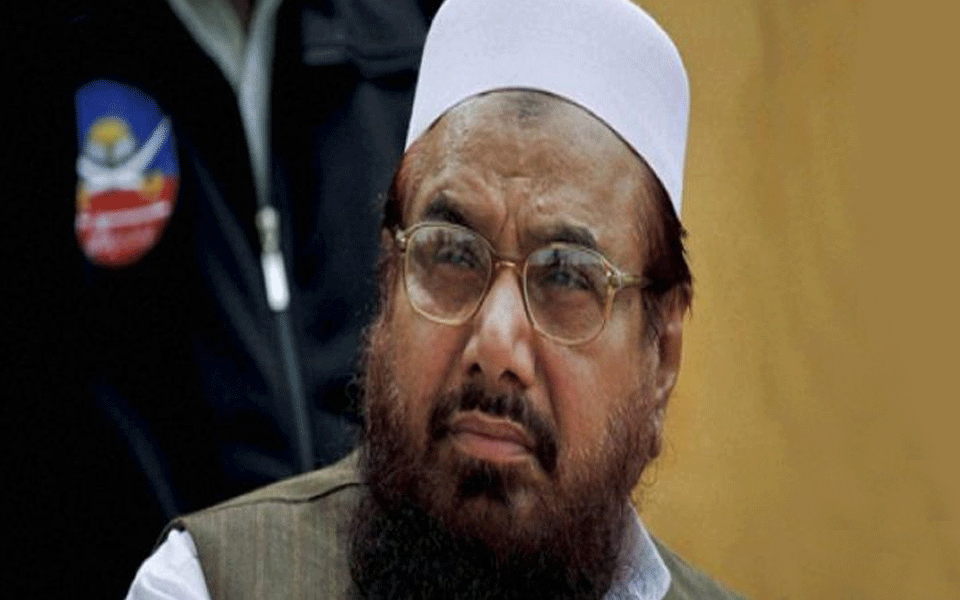New York, Mar 7: Pakistan turned down the visa request of a UN team which wanted to interview Mumbai attack mastermind and Jamaat-ud-Dawa chief Hafiz Saeed on his application for removing his name from the UNSC sanctions list, according to UN sources.
Saeed was listed under UN Security Council Resolution 1267 in December 2008 after the Mumbai terror attack in which 10 Lashkar-e-Taiba terrorists killed 166 people. He was released from house arrest in Pakistan in November 2017.
A representative from the Permanent Mission of Pakistan to the UN informed the UN Ombudsperson in October last year that no visa would be issued for their travel to Pakistan, UN sources told PTI.
The UN Ombudsperson reviews requests from UN designated individuals and entities to be removed from the UN Sanctions Committee listing.
Sources said the Pakistani representative had sought that the visit be postponed till the beginning of 2019 but the Ombudsperson had made it clear that such an extension for the travel could not be given due relevant UNSC provisions and an extension could be made only till late December 2018.
According to the relevant provisions, the UN Security Council had directed the Al-Qaida Sanctions Committee to keep "under active review" its guidelines for placing, removing or granting exemptions to individuals and entities on its Al-Qaida Sanctions List.
Pakistani officials failed to convey in time to the Ombudsperson regarding the travel to Pakistan after which the UN team sought a video conference with Saeed.
UN sources said that following the video interview, the UN Ombudsperson determined that Saeed's name will not be removed from the 1267 Al Qaida Sanctions Committee listing.
They said that the Ombudsperson "analysed" all the information that had been gathered on the case and "provided observations", setting out for the Committee "the principal arguments" on Saeed's request for delisting.
The sources added that the Ombudsperson determined that there is "sufficient information" available for the "current listing."
After analyzing and taking into consideration all the information on Saeed's case and his request for de-listing "in totality", the Ombudsperson recommended to the Sanctions Committee that Saeed's name should be retained in the Al-Qaida Sanctions List.
The UN decision to reject appeal of Saeed, also the LeT founder, came after India provided detailed evidence including "highly confidential information" about his activities, sources said.
Saeed had filed an appeal with the UN through Lahore-based law firm Mirza and Mirza in 2017, while he was still under house arrest in Pakistan, for removal of the ban.
Independent Ombudsperson Daniel Kipfer Fasciati, appointed by the UN to examine all such requests, has informed Saeed's lawyer that it has been decided following examination of his request that that he will "continue as a listed individual", sources said.
The Ombudsperson recommended that after gathering all information, it has been decided to continue with the ban as "there was sufficient information to provide a reasonable and credible basis for continuing the listing," sources said, adding the recommendation was endorsed by the UN's Sanctions Committee.
Saeed's request was opposed by India as well as other countries that had originally listed him - US, UK and France, sources said.
Significantly, Pakistan did not oppose the appeal despite claims by the new Imran Khan-led government there that it was taking action against the banned terrorists and their organisations in what they call a ''Naya Pakistan''.
Notably, the decision comes at a time when UN's 1267 Sanctions Committee has received a new request to designate Jaish-e-Mohammad chief Masood Azhar a global terrorist after the Pulwama terror attack in which 40 CRPF personnel were killed. Pakistan-based JeM has claimed responsibility for the strike.
Let the Truth be known. If you read VB and like VB, please be a VB Supporter and Help us deliver the Truth to one and all.
Dubai: Smoke was seen rising from an area near the United States Consulate in Dubai, according to witness accounts cited by Reuters.
There was no immediate official confirmation on the extent of damage or whether there were any casualties in the incident.
Earlier, the US embassy in Riyadh, Saudi Arabia’s capital, was also attacked. Authorities reported damage to the premises, but no casualties were recorded.
The developments come amid heightened tensions in the region, with Iran continuing to target US interests in the Middle East following deadly attacks launched on Saturday by Israel and the United States.
Near US embassy in Dubai pic.twitter.com/z5VTZNVxNO
— Sahil Shah (@thesahilsshah) March 3, 2026





